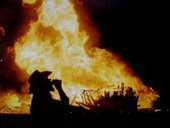 Well, the cat's out of the bag: the US Air Force is traveling to other planets on a routine basis. All that stuff NASA's doing with the shuttle, space station and plans to go back to the moon someday, are just a smoke screen to keep us from knowing what's really going on.
Well, the cat's out of the bag: the US Air Force is traveling to other planets on a routine basis. All that stuff NASA's doing with the shuttle, space station and plans to go back to the moon someday, are just a smoke screen to keep us from knowing what's really going on. I submit as evidence this frame, snapped from a USAF recruiting ad that's been getting a lot of TV and internet play. You can see the whole ad here. The helicopter comes in, drops off a couple paratroopers, and as we see clearly in the screen snap, they float down into the jungle, silhouetted against a pair of large moons. Which, of course, means it's not taking place on Planet Earth, which has only one moon (if you don't believe me on this, go out and check tonight).
So, it's a bit of sci-fi, a bit of artistic license, perhaps? Nope--a few seconds later, the ad explicitly states that "IT'S NOT SCIENCE FICTION. IT'S WHAT WE DO EVERY DAY."

Which, of course, leaves us with only two possibilities: first, that the ad is lying to us. We can dismiss this, of course, as we know the government never lies. That leaves only the second option: that the Air Force does in fact conduct everyday operations on another planet, one that's apparently covered in jungles and equipped with two moons.
Somehow, this makes me feel better about the military budget. When you read the news stories about Pentagon projects going massively over budget while delivering bombers that can't be flown in the rain, or the infamous $600 toilet seat, or the latest over-runs on airplanes the military doesn't even want anymore, it's easy to get depressed about where our tax dollars are going. But, thanks to this ad, we know that the money's really been going into the development of technology that's now routinely visiting other planets (and rather cool-looking ones at that).
I can't wait for the next revelation: that all that stuff in "Avatar" isn't CGI after all, but another of the planets where the Air Force is operating every day.




